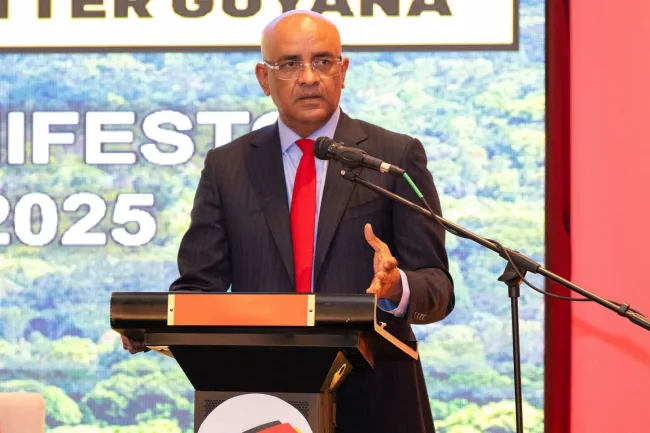Close

The People’s Progressive Party/Civic (PPP/C) has announced plans to transform public sector service delivery through a series of nationwide reforms, should it secure another term in office following the September 1 elections. The measures, presented in the party’s 2025 manifesto, are designed to improve efficiency, transparency, and accountability across government operations (Department of Public Information).
A central component of the initiative is the introduction of mandatory service standards in all public institutions. These standards would require ministries and agencies to publicly display advisories outlining transaction procedures, required documentation, processing timelines, and applicable fees. The aim is to ensure that citizens clearly understand what to expect when accessing services, while reducing uncertainty and unnecessary delays (Ministry of Public Service).
To complement this, the manifesto proposes the establishment of a national call and message centre that will operate alongside the existing AskGov digital platform. Through these channels, members of the public will be able to seek information, lodge complaints, and provide feedback, with each case tracked until resolution. This mechanism is intended to strengthen communication between citizens and state institutions while ensuring greater responsiveness to issues raised (Department of Public Information).
In addition, the PPP/C has committed to introducing mandatory customer service training for all public-facing employees. This move seeks to address long-standing inefficiencies within the sector, which have often been linked to outdated processes, limited staff capacity, and inconsistent accountability systems. By equipping staff with training focused on professionalism and citizen-centered service, the party hopes to reshape the culture of public administration (Ministry of Public Service).
The manifesto also extends its vision beyond government, encouraging private sector organisations to adopt similar standards and training programmes. By doing so, the party aims to raise the overall standard of customer service across the country, fostering an environment where efficiency and accountability become the norm (Department of Public Information).
According to the PPP/C, these measures are intended not only to reduce delays and frustrations experienced by citizens but also to prepare the public service for the demands of a rapidly growing economy. The party has underscored that modernising government operations and making them more accessible and responsive is critical to improving quality of life and building trust in state institutions (Ministry of Public Service).
If implemented, the proposed reforms would represent one of the most comprehensive attempts in recent years to reorient Guyana’s public service toward efficiency, transparency, and citizen satisfaction (Department of Public Information).

The Guyana Project is an independent media platform delivering fact-checked, ground-level reporting on politics, economy, and public life in Guyana. With a focus on transparency and development, we bring unfiltered news and thoughtful analysis to help shape a more informed, forward-looking nation.

PPP/C outlines service delivery reforms in 2025 manifesto

Lorem Ipsum is simply dummy text of the printing and typesetting industry. Lorem Ipsum has been the industry’s standard dummy text ever since the 1500s, when an unknown printer took a galley of type and scrambled it to make a type specimen book. It has survived not only five centuries, but also the leap into electronic typesetting, remaining essentially unchanged. It was popularised in the 1960s with the release of Letraset sheets containing Lorem Ipsum passages, and more recently with desktop publishing software like Aldus PageMaker including versions of Lorem Ipsum.
t is a long established fact that a reader will be distracted by the readable content of a page when looking at its layout. The point of using Lorem Ipsum is that it has a more-or-less normal distribution of letters, as opposed to using ‘Content here, content here’, making it look like readable English. Many desktop publishing packages and web page editors now use Lorem Ipsum as their default model text, and a search for ‘lorem ipsum’ will uncover many web sites still in their infancy. Various versions have evolved over the years, sometimes by accident, sometimes on purpose (injected humour and the like).
Contrary to popular belief, Lorem Ipsum is not simply random text. It has roots in a piece of classical Latin literature from 45 BC, making it over 2000 years old. Richard McClintock, a Latin professor at Hampden-Sydney College in Virginia, looked up one of the more obscure Latin words, consectetur, from a Lorem Ipsum passage, and going through the cites of the word in classical literature, discovered the undoubtable source. Lorem Ipsum comes from sections 1.10.32 and 1.10.33 of “de Finibus Bonorum et Malorum” (The Extremes of Good and Evil) by Cicero, written in 45 BC. This book is a treatise on the theory of ethics, very popular during the Renaissance. The first line of Lorem Ipsum, “Lorem ipsum dolor sit amet..”, comes from a line in section 1.10.32.